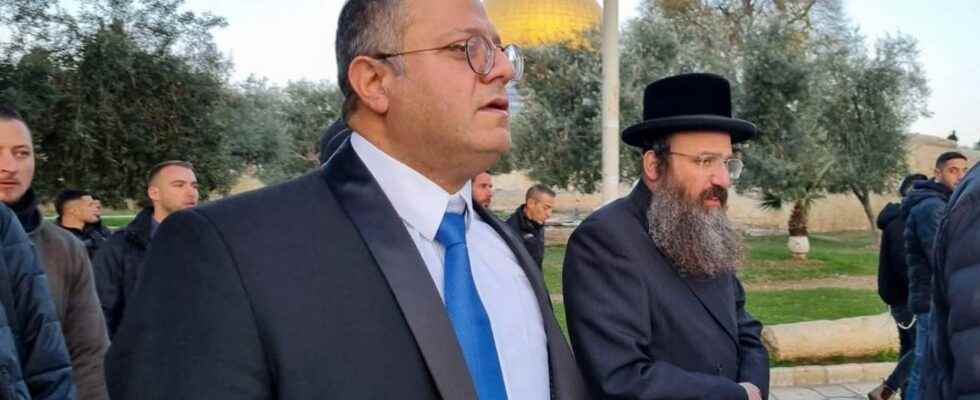Palestinians in Hebron have known Itamar Ben-Gvir for a long time. The new strongman of the Israeli government, a supremacist appointed Minister of National Security, began his career and forged his reputation in the explosive streets of the Jewish quarter of this West Bank city. “I never considered him an extremist, says Abdelnasser Mansour, a resident of the historic center. For me, Ben-Gvir represents the true face of Israel. Simply, he expresses frankly what the other leaders mask with diplomatic formulas.
“It only gives the world the image that we already have of Israel”
This feeling of an Israeli government finally revealing its intentions runs through all of Palestinian society. Even the very provocative visit of Ben-Gvir on the Esplanade of the mosques, Tuesday January 3, does not arouse any particular emotion. In the cafes of Ramallah, where political ideas are exchanged in thick hookah smoke, Palestinian youth comment more readily on football news than on the new Israeli government. “I don’t think it will change anything for Palestinians in the occupied West Bank,” said Samir, 33, who works in the security sector. “This is bad news for the Palestinians of East Jerusalem or Israel, he adds. But we in the West Bank have already been facing the far right and the settlers for years. than give the world the image we already have of Israel.”
The weariness of the Palestinian street can be understood. Since Benyamin Netanyahu came to power almost fifteen years ago, Israel has ruled out any resumption of the peace process and has continued imperturbably with its policy of colonization in the West Bank. The Palestinians see the multiplication of red-roofed villas in Jewish settlements every day and they continue to wait for hours at the military checkpoints that filter access to large cities. In recent months, the Jewish state has undertaken pharaonic works to improve the Israeli road network in the West Bank. Soon, real highways will serve the main settlement regions of the territory. “All their politics show that they are settling for the long term, I don’t see how it could be worse,” said Ahmed, who lives in a village crossed by Route 60, the main road in the West Bank.
The Israeli grip on this territory conquered by Tsahal in 1967 should however take a further step with this new government. Under the impetus of Itamar Ben-Gvir and his alter ego of the religious Zionist party Betsalel Smotrich, the Netanyahu VI government is preparing to legalize some sixty outposts (settlements illegal, even under Israeli law) and to toughen the repression of Palestinian armed groups. As for the Esplanade of the Mosques, it once again finds itself at the epicenter of the conflict. Prohibited by most rabbis, the climb to the “Temple Mount” is attracting a growing number of young religious nationalists. “To touch Al Aqsa is to touch the heart of the Palestinian Muslim identity. Jerusalem remains central for the Palestinians. It is the very dangerous game of a violent man”, deplores Inès Abdel Razek, director of the Institute Palestinian for diplomacy, Franco-Palestinian.
The risk of a third intifada
Much discredited, the Palestinian Authority is trying to regain the initiative. Prime Minister Muhammad Shtatiyyeh vehemently condemned the rise of this particularly right-wing coalition, denouncing an Israeli government that was “annexationist, violent, racist and inciting ethnic cleansing”. Tuesday, in an extremely rare step, he even called on the Palestinians to “defend” access to the Esplanade of the mosques. But the injunction was hardly heard. “The disconnection between Palestinian society and its government can only crack further with this new coalition. If the Palestinian Authority accepts this situation as a vassal of Israel, society will move towards more confrontation”, fears Inès Abdel Razek.
Earlier this year, King Abdullah of Jordan expressed concern about a third Intifada, which would be triggered by provocations from the new Israeli government. “If this happens, we will see a complete breakdown of law and order, it will not be a good thing for the Israelis or the Palestinians,” asserted the sovereign, whose country is the guarantor of the holy sites in East Jerusalem. King Abdullah is well aware that the Second Intifada began in September 2000 after Ariel Sharon’s visit to the Esplanade of Mosques, triggering years of unrest and violence. All it took was a spark to set the region ablaze…
